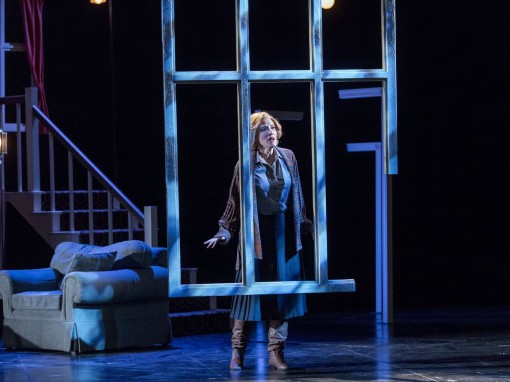Though the spirits are pallid, City Opera’s Britten proves haunting

Sara Jakubiak as the Governess in New York City Opera’s production of Britten’s “The Turn of the Screw.”
The Turn of the Screw, the 1898 novella by Henry James on which Benjamin Britten’s 1954 opera is based, is an extravaganza of indirection and serpentine syntax. Its characters tend to talk past each other, their breathless exchanges leaving matters of grave import half-spoken and tantalizingly vague. Scholars and everyday readers continue to debate whether its protagonist, a governess is deluded in her belief that malign spirits have corrupted her young charges and toxic herself, or whether the ghosts are real and the governess’s actions brave and proper.
James’s ghosts are silent, and readers see them only through the eyes of the governess, who narrates the events in question in an old manuscript written “in faded ink.” Britten and his librettist Myfanwy Piper instead chose to have their ghosts sing, and therein lies the fundamental weakness of New York City Opera’s new production of The Turn of the Screw, which opened at the Brooklyn Academy of Music on Sunday.
Though NYCO’s cast sings superlatively well, Sam Buntrock’s production, with handsome sets and costumes by David Farley and lighting by David Weiner, fails to convince in the end because its specters are too, too solid and mundane. The staging does reserve an uncanny twist for the final scene, but onstage ghouls and fiends remain difficult to pull off, here as elsewhere. (Mary Zimmerman’s superfluous fantasma in Metropolitan Opera staging of Lucia di Lammermoor was invariably greeted with giggles.)
The problem of the ghosts is unsolved, but NYCO’s singers and orchestra, led in brilliant fashion by Jayce Ogren, rise triumphantly to every challenge laid down in Britten’s ravishing and astringent score. Sara Jakubiak, a superb Fiordiligi in last season’s NYCO Così fan tutte, serves up lustrous and cultivated tone as the governess and, like all her Turn of the Screw colleagues, articulates the text with exemplary clarity. In contrast to the James novella, Britten’s opera suggests rather strongly that her wards are indeed vicious. Jakubiak is a cool and ladylike governess, but her final words—Together, we have destroyed him—gleam like a razor’s edge in their sinister ambiguity: Have she and little Miles destroyed the ghost Peter Quint, or have she and Quint destroyed Miles, who lies dead in her arms?
Like Jakubiak, tenor Dominic Armstrong as the Prologue and Peter Quint gives a masterly performance. Early on, a handful of times, we hear the inhaled syllables and gluey slides that sometimes marred the singing of the great Sir Peter Pears, who created the Prologue and Quint, but Armstrong quickly leaves such foibles behind. He has a richer, more seductive timbre than Pears, and he excels in Britten’s declamatory writing—his words preternaturally crisp and distinct—and in the sultry, lavish fioritura with which Quint seeks to bewitch Miles, or so the governess hears and believes. Armstrong makes the most of his standard-issue zombie getup, his eyes wild and glazed, his presence a black hole of venomous purpose.
Young Lauren Worsham as Flora and Benjamin P. Wenzelberg as Miles turn in portrayals that would do any seasoned artist proud. Their enunciation is crystalline and their way with words telling but unfussy. Worsham’s sweet, girlish voice has a touch of womanly richness in its lowest reaches, lending a troubling dimension to this tale in which “the ceremony of innocence is drowned.”
Wenzelberg is an assured actor and a deeply musical singer, and his tone shifts to disquieting effect from bright and piping to blanched and wraithlike as he sings his Malo, malo, malo song. The schoolboy Latin ditty has unnerving implications: the homophone “malo” can denote evil, adversity, personal proclivities, and the apple tree that precipitated humanity’s fall. Some critics suggest that the Malo air, like the other bits of Latin in the opera that are not in the novella, play up the pedophilic intimations of James’s tale. Alluded to with restraint in NYCO’s staging, these hints of dark perversion ripple through Britten’s sometimes icy-cold and unearthly score.
Sharmay Musacchio is a sympathetic Mrs. Grose, her tone fleetingly hard in the role’s highest reaches. Jennifer Goode Cooper as Miss Jessel unfurls a voice both ripe and imbued with the shadows and torments of the netherworld.
As night falls for the first time at Bly, the estate where the governess keeps watch over the children, Britten conjures an uneasy pastoral—like Eden, a landscape where worms stalk apples and shuddering strings forge an uneasy counterpoint to callow, chirping winds. From the pinprick pizzicati that accompany Quint’s apparitions to the soiled decorum of the music that Miles plays on the piano (the eerie sounds, like Mozart or Beethoven refracted through a funhouse mirror, in fact begin before he sits down), Ogren and the NYCO orchestra make taut, spine-tingling magic of Britten’s wondrous score. Though the ghost story falls flat, this Turn of the Screw carries the day with singing and playing on the highest level.
The Turn of the Screw repeats February 26, 28, and March 2 at the Brooklyn Academy of Music’s Howard Gilman Opera House. bam.org; 718-636-4100.